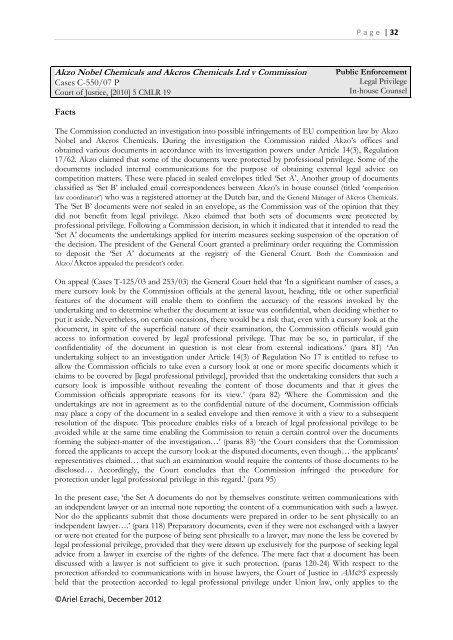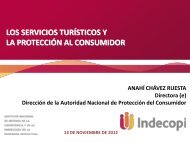EU Competition Law and Policy - compal
EU Competition Law and Policy - compal
EU Competition Law and Policy - compal
You also want an ePaper? Increase the reach of your titles
YUMPU automatically turns print PDFs into web optimized ePapers that Google loves.
Akzo Nobel Chemicals <strong>and</strong> Akcros Chemicals Ltd v Commission<br />
Cases C-550/07 P<br />
Court of Justice, [2010] 5 CMLR 19<br />
Facts<br />
©Ariel Ezrachi, December 2012<br />
P a g e | 32<br />
Public Enforcement<br />
Legal Privilege<br />
In-house Counsel<br />
The Commission conducted an investigation into possible infringements of <strong>EU</strong> competition law by Akzo<br />
Nobel <strong>and</strong> Akcros Chemicals. During the investigation the Commission raided Akzo’s offices <strong>and</strong><br />
obtained various documents in accordance with its investigation powers under Article 14(3), Regulation<br />
17/62. Akzo claimed that some of the documents were protected by professional privilege. Some of the<br />
documents included internal communications for the purpose of obtaining external legal advice on<br />
competition matters. These were placed in sealed envelopes titled ‘Set A’. Another group of documents<br />
classified as ‘Set B’ included email correspondences between Akzo’s in house counsel (titled ‘competition<br />
law coordinator’) who was a registered attorney at the Dutch bar, <strong>and</strong> the General Manager of Akcros Chemicals.<br />
The ‘Set B’ documents were not sealed in an envelope, as the Commission was of the opinion that they<br />
did not benefit from legal privilege. Akzo claimed that both sets of documents were protected by<br />
professional privilege. Following a Commission decision, in which it indicated that it intended to read the<br />
‘Set A’ documents the undertakings applied for interim measures seeking suspension of the operation of<br />
the decision. The president of the General Court granted a preliminary order requiring the Commission<br />
to deposit the ‘Set A’ documents at the registry of the General Court. Both the Commission <strong>and</strong><br />
Akzo/Akcros appealed the president’s order.<br />
On appeal (Cases T-125/03 <strong>and</strong> 253/03) the General Court held that ‘In a significant number of cases, a<br />
mere cursory look by the Commission officials at the general layout, heading, title or other superficial<br />
features of the document will enable them to confirm the accuracy of the reasons invoked by the<br />
undertaking <strong>and</strong> to determine whether the document at issue was confidential, when deciding whether to<br />
put it aside. Nevertheless, on certain occasions, there would be a risk that, even with a cursory look at the<br />
document, in spite of the superficial nature of their examination, the Commission officials would gain<br />
access to information covered by legal professional privilege. That may be so, in particular, if the<br />
confidentiality of the document in question is not clear from external indications.’ (para 81) ‘An<br />
undertaking subject to an investigation under Article 14(3) of Regulation No 17 is entitled to refuse to<br />
allow the Commission officials to take even a cursory look at one or more specific documents which it<br />
claims to be covered by [legal professional privilege], provided that the undertaking considers that such a<br />
cursory look is impossible without revealing the content of those documents <strong>and</strong> that it gives the<br />
Commission officials appropriate reasons for its view.’ (para 82) ‘Where the Commission <strong>and</strong> the<br />
undertakings are not in agreement as to the confidential nature of the document, Commission officials<br />
may place a copy of the document in a sealed envelope <strong>and</strong> then remove it with a view to a subsequent<br />
resolution of the dispute. This procedure enables risks of a breach of legal professional privilege to be<br />
avoided while at the same time enabling the Commission to retain a certain control over the documents<br />
forming the subject-matter of the investigation…’ (paras 83) ‘the Court considers that the Commission<br />
forced the applicants to accept the cursory look at the disputed documents, even though… the applicants'<br />
representatives claimed… that such an examination would require the contents of those documents to be<br />
disclosed… Accordingly, the Court concludes that the Commission infringed the procedure for<br />
protection under legal professional privilege in this regard.’ (para 95)<br />
In the present case, ‘the Set A documents do not by themselves constitute written communications with<br />
an independent lawyer or an internal note reporting the content of a communication with such a lawyer.<br />
Nor do the applicants submit that those documents were prepared in order to be sent physically to an<br />
independent lawyer….’ (para 118) Preparatory documents, even if they were not exchanged with a lawyer<br />
or were not created for the purpose of being sent physically to a lawyer, may none the less be covered by<br />
legal professional privilege, provided that they were drawn up exclusively for the purpose of seeking legal<br />
advice from a lawyer in exercise of the rights of the defence. The mere fact that a document has been<br />
discussed with a lawyer is not sufficient to give it such protection. (paras 120-24) With respect to the<br />
protection afforded to communications with in house lawyers, the Court of Justice in AM&S expressly<br />
held that the protection accorded to legal professional privilege under Union law, only applies to the



